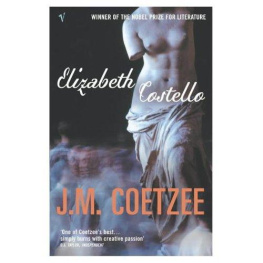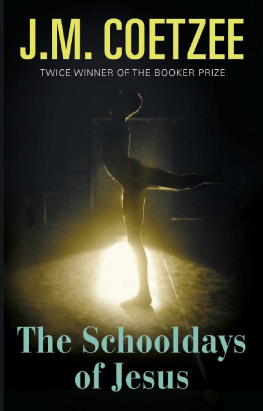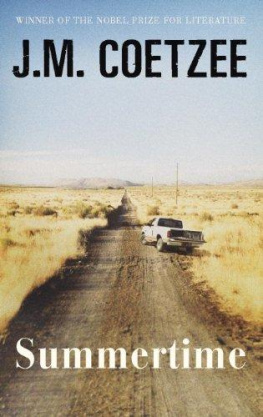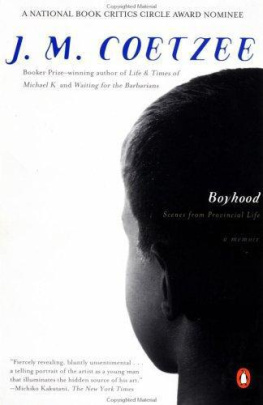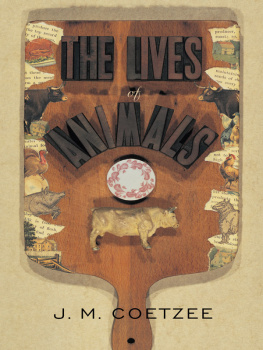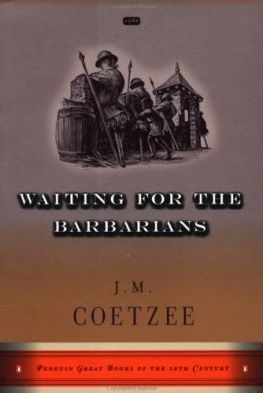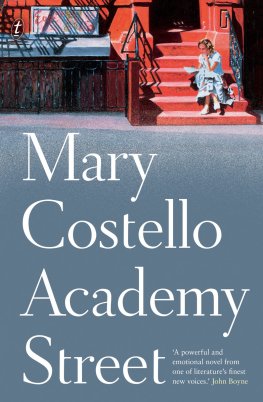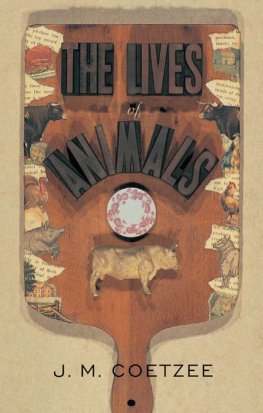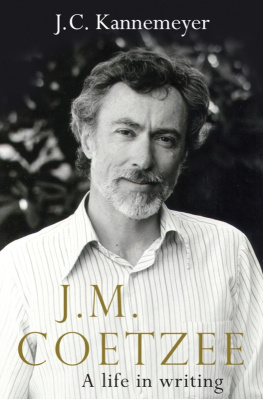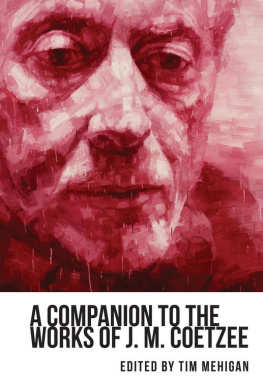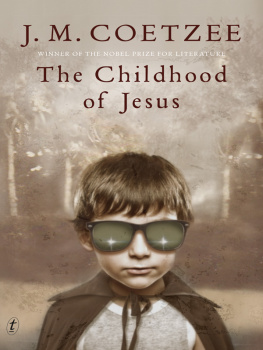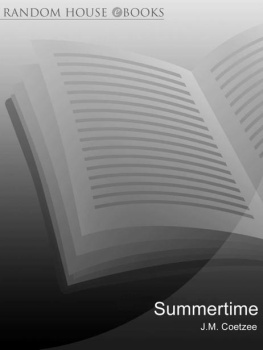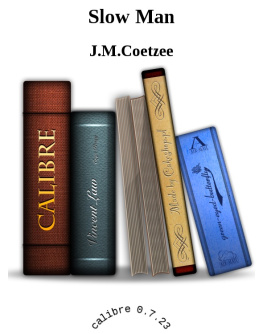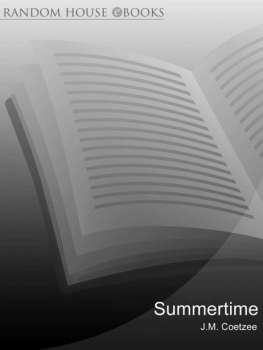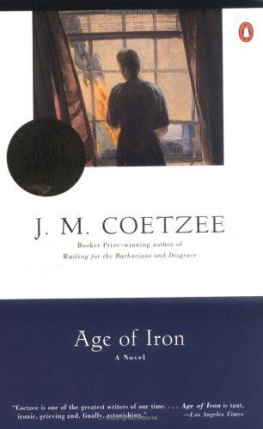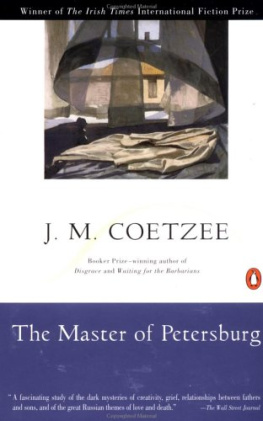J. M. Coetzee - Elizabeth Costello
Here you can read online J. M. Coetzee - Elizabeth Costello full text of the book (entire story) in english for free. Download pdf and epub, get meaning, cover and reviews about this ebook. year: 2003, genre: Art. Description of the work, (preface) as well as reviews are available. Best literature library LitArk.com created for fans of good reading and offers a wide selection of genres:
Romance novel
Science fiction
Adventure
Detective
Science
History
Home and family
Prose
Art
Politics
Computer
Non-fiction
Religion
Business
Children
Humor
Choose a favorite category and find really read worthwhile books. Enjoy immersion in the world of imagination, feel the emotions of the characters or learn something new for yourself, make an fascinating discovery.
- Book:Elizabeth Costello
- Author:
- Genre:
- Year:2003
- Rating:4 / 5
- Favourites:Add to favourites
- Your mark:
- 80
- 1
- 2
- 3
- 4
- 5
Elizabeth Costello: summary, description and annotation
We offer to read an annotation, description, summary or preface (depends on what the author of the book "Elizabeth Costello" wrote himself). If you haven't found the necessary information about the book — write in the comments, we will try to find it.
Elizabeth Costello — read online for free the complete book (whole text) full work
Below is the text of the book, divided by pages. System saving the place of the last page read, allows you to conveniently read the book "Elizabeth Costello" online for free, without having to search again every time where you left off. Put a bookmark, and you can go to the page where you finished reading at any time.
Font size:
Interval:
Bookmark:
J.M. Coetzee
Elizabeth Costello
First published in 2003
Contents
Lesson 1 Realism - 1
Lesson 2 The Novel in Africa - 35
Lesson 3 The Lives of Animals: - 59
ONE: The Philosophers and the Animals
Lesson 4 The Lives of Animals: - 91
TWO: The Poets and the Animals
Lesson 5 The Humanities in Africa - 116
Lesson 6 The Problem of Evil - 156
Lesson 7 Eros - 183
Lesson 8 At the Gate - 193
Postscript: Letter of Elizabeth, Lady Chandos - 227
Realism
There is first of all the problem of the opening, namely, how to get us from where we are, which is, as yet, nowhere, to the far bank. It is a simple bridging problem, a problem of knocking together a bridge. People solve such problems every day. They solve them, and having solved them push on.
Let us assume that, however it may have been done, it is done. Let us take it that the bridge is built and crossed, that we can put it out of our mind. We have left behind the territory in which we were. We are in the far territory, where we want to be.
Elizabeth Costello is a writer, born in 1928, which makes her sixty-six years old, going on sixty-seven. She has written nine novels, two books of poems, a book on bird life, and a body of journalism. By birth she is Australian. She was born in Melbourne and still lives there, though she spent the years 1951 to 1963 abroad, in England and France. She has been married twice. She has two children, one by each marriage.
Elizabeth Costello made her name with her fourth novel, The House on Eccles Street (1969), whose main character is Marion Bloom, wife of Leopold Bloom, principal character of another novel, Ulysses (1922), by James Joyce. In the past decade there has grown up around her a small critical industry; there is even an Elizabeth Costello Society, based in Albuquerque, New Mexico, which puts out a quarterly Elizabeth Costello Newsletter.
In the spring of 1995 Elizabeth Costello travelled, or travels (present tense henceforth), to Williamstown, Pennsylvania, to AltonaCollege, to receive the Stowe Award. The award is made biennially to a major world writer, selected by a jury of critics and writers. It consists of a purse of $50,000, funded by a bequest from the Stowe estate, and a gold medal. It is one of the larger literary prizes in the United States.
On her visit to Pennsylvania Elizabeth Costello (Costello is her maiden name) is accompanied by her son John. John has a job teaching physics and astronomy at a college in Massachusetts, but for reasons of his own is on leave for the year. Elizabeth has become a little frail: without the help of her son she would not be undertaking this taxing trip across half the world.
We skip. They have reached Williamstown and have been conveyed to their hotel, a surprisingly large building for a small city, a tall hexagon, all dark marble outside and crystal and mirrors inside. In her room a dialogue takes place.
'Will you be comfortable?' asks the son.
'I am sure I will,' she replies. The room is on the twelfth floor, with a prospect over a golf course and, beyond that, over wooded hills.
'Then why not have a rest? They are fetching us at six thirty. I'll give you a call a few minutes beforehand.'
He is about to leave. She speaks.
'John, what exactly do they want from me?'
'Tonight? Nothing. It's just a dinner with members of the jury. We won't let it turn into a long evening. I'll remind them you are tired.'
'And tomorrow?'
'Tomorrow is a different story. You'll have to gird your loins for tomorrow, I am afraid.'
'I have forgotten why I agreed to come. It seems a great ordeal to put oneself through, for no good reason. I should have asked them to forget the ceremony and send the cheque in the mail.'
After the long flight, she is looking her age. She has never taken care of her appearance; she used to be able to get away with it; now it shows. Old and tired.
'It doesn't work that way, I am afraid, Mother. If you accept the money, you must go through with the show.'
She shakes her head. She is still wearing the old blue raincoat she wore from the airport. Her hair has a greasy, lifeless look. She has made no move to unpack. If he leaves her now, what will she do? Lie down in her raincoat and shoes?
He is here, with her, out of love. He cannot imagine her getting through this trial without him at her side. He stands by her because he is her son, her loving son. But he is also on the point of becoming--distasteful word--her trainer.
He thinks of her as a seal, an old, tired circus seal. One more time she must heave herself up on to the tub, one more time show that she can balance the ball on her nose. Up to him to coax her, put heart in her, get her through the performance.
'It is the only way they have,' he says as gently as he can. 'They admire you, they want to honour you. It is the best way they can think of doing that. Giving you money. Broadcasting your name. Using the one to do the other.'
Standing over the Empire-style writing table, shuffling through the pamphlets that tell her where to shop, where to dine, how to use the telephone, she casts him one of the quick, ironic looks that still have the power to surprise him, to remind him of who she is. 'The best way?' she murmurs.
At six thirty he knocks. She is ready, waiting, full of doubts but prepared to face the foe. She wears her blue costume and silk jacket, her lady novelist's uniform, and the white shoes with which there is nothing wrong yet which somehow make her look like Daisy Duck. She has washed her hair and brushed it back. It still looks greasy, but honourably greasy, like a navvy's or a mechanic's. Already on her face the passive look that, if you saw it in a young girl, you would call withdrawn. A face without personality, the kind that photographers have to work on to lend distinction. Like Keats, he thinks, the great advocate of blank receptiveness.
The blue costume, the greasy hair, are details, signs of a moderate realism. Supply the particulars, allow the significations to emerge of themselves. A procedure pioneered by Daniel Defoe. Robinson Crusoe, cast up on the beach, looks around for his shipmates. But there are none. 'I never saw them afterwards, or any sign of them,' says he, 'except three of their hats, one cap, and two shoes that were not fellows.' Two shoes, not fellows: by not being fellows, the shoes have ceased to be footwear and become proofs of death, torn by the foaming seas off the feet of drowning men and tossed ashore. No large words, no despair, just hats and caps and shoes.
For as far back as he can remember, his mother has secluded herself in the mornings to do her writing. No intrusions under any circumstances. He used to think of himself as a misfortunate child, lonely and unloved. When they felt particularly sorry for themselves, he and his sister used to slump outside the locked door and make tiny whining sounds. In time the whining would change to humming or singing, and they would feel better, forgetting their forsakenness.
Now the scene has changed. He has grown up. He is no longer outside the door but inside, observing her as she sits, back to the window, confronting, day after day, year after year, while her hair slowly goes from black to grey, the blank page. What doggedness, he thinks! She deserves the medal, no doubt about that, this medal and many more. For valour beyond the call of duty.
The change came when he was thirty-three. Until then he had not read a word she had written. That was his reply to her, his revenge on her for locking him out. She denied him, therefore he denied her. Or perhaps he refused to read her in order to protect himself. Perhaps that was the deeper motive: to ward off the lightning stroke. Then one day, without a word to anyone, without even a word to himself, he took one of her books out of the library. After that he read everything, reading openly, in the train, at the lunch table. 'What are you reading?'
Next pageFont size:
Interval:
Bookmark:
Similar books «Elizabeth Costello»
Look at similar books to Elizabeth Costello. We have selected literature similar in name and meaning in the hope of providing readers with more options to find new, interesting, not yet read works.
Discussion, reviews of the book Elizabeth Costello and just readers' own opinions. Leave your comments, write what you think about the work, its meaning or the main characters. Specify what exactly you liked and what you didn't like, and why you think so.

